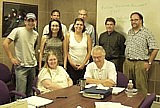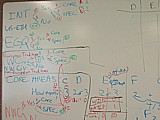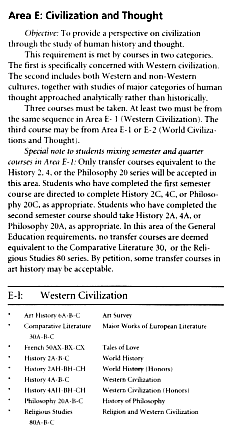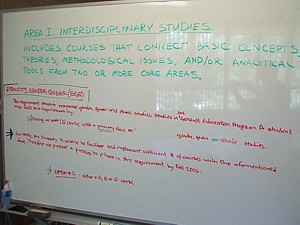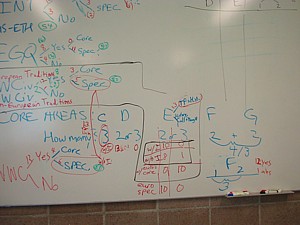Announcements
(old announcements
move to bottom)
- May 2021: On May 13, after receiving comments from a number of individual faculty members, I added a fair amount of specificity to the proposal to remove the "European Traditions" category, especially about implementation (May 13 three page pdf version+UC comparison table). As of May 17, UCSB's Senate is still obfuscating and refusing to send it to the committees. Although every Faculty Legislature agenda has an item "Student Petitions," students were told that there is no such mechanism. Sounds like subterfuge to me.
- April 2021: In support of a student petition to UCSB's faculty Senate, on March 22 I was asked to draft an explicit reform proposal for removing our "European Traditions" requirement from our GE curriculum. As a quick and easily implementable solution, we decided to propose removing the category, thus making the requirement vanish without changing anything else.
- January 2021: The newsletter of the American Historical Association published a short overview of the role of History courses in General Education:
- Norm Jones [emeritus, Utah State], "Core of the Matter: The Complex Roles of History Courses in General Education," Perspectives (Jan. 2021), 25-27.
- Jones reports on the results of an AHA survey, in which 487 schools answered the question "Describe briefly history's current role in the required general edcuation program for your institution, if any."
- At his institution, from 1889 to 1915 two history courses were required of all students: History 1 (Europe) and History 2 (United States).
- Jones outlines the "core" and "distribution" GE models. In the former, History (US and world) are usually included "reflexively" (without needing justification). In the latter, History can be classified as a humanities discipline, or a social science. Enrollments tend to be higher when it is included in the humanities, since it competes with fewer disciplines, whereas in the social sciences more, larger disciplines vye for students.
- He concludes that it is important for History to be able to articulate what its role in the curriculum should be, and recommends the AHA's Discipline Core (from 2016).
- August 5, 2020: The NPR podcast Code Switch did a show titled "The Long, Bloody Strike For Ethnic Studies" (38 mins.), which discusses how ethnic studies requirements were created and integrated into GE programs.
- June 30, 2020: In the wake of the murder of George Floyd and the resurgence of the Black Lives Matter movement, the UCSB History Department is moving to integrate anti-racism into our curriculum in substantial ways. One suggestion (mine) is to support replacing the current UCSB General Education "European Traditions" course requirement with an additional "Ethnicity" course focusing specifically on the experiences of African-Americans or indigenous peoples in the United States. (Or: with a course focusing specifically on the role of structural racism in the history of the United States. Or, to turn ET on its head: focusing specifically on the role of structural racism in the United States and other postcolonial societies.)
One hurdle to overcome is to be sure we offer enough courses and seats in courses that all students will be able to fulfill this requirement. That necessitates collecting all courses across the campus that would satisfy this new requirement.
- March 1, 2020: "UCSB Student Advocates For the Replacement of European Traditions Requirement," UCSB Daily Nexus, 2/27/2020. The long article begins:
"The European Traditions requirement has been part of UC Santa Barbara’s General Education Program in some form since the 80s, but in 2003, a taskforce was formed to remove the requirement — known then as the Western Civilizations requirement — albeit unsuccessfully.
Now, Ciara Thrower, a third-year environmental studies major, is authoring a proposal to present to the UCSB Academic Senate that would dissolve the requirement and merge it into the World Cultures requirement, after she gained the unanimous support of the Associated Students (A.S.) Senate last week. Thrower said that the European Traditions requirement has a 'bad connotation' and has bothered her since her freshman year, as she believes many classes outside the requirement are often Eurocentric."
- Aug. 23, 2018: In case anyone should happen upon this page and not know of much more recent literature--several studies of GE have been done. Here's a review of a recent one, namely
- Geoffrey Harpham, What Do You Think, Mr. Ramirez?: The American Revolution in Education (University of Chicago Press, 2017), 247 pages.
Review by Colleen Flaherty, "Seeking a New 'Golden Age' of General Education," in: Inside Higher Education (Aug. 6, 2018). Tagline: What's a general education? Book by noted literary critic advocates a return to the basics.
- Aug. 15, 2015: The UCSB Assessment Project summarizes the GE Subject Area Learning Outcomes--these are being reworked in 2015.
- May 5, 2015: "Does UCSB Need a General Education Reform?" article in UCSB's The Bottom Line, May 21, 2014. Argues for depth requirement instead of breadth.
- May 27, 2010: At UCLA the science requirement has
been temporarily reduced from 4 courses to 3 to enable the development
of more appropriate lower division course offerings: "Faculty
Executive Committee votes to keep undergraduate language requirement
and instead reduce science GE course requirements temporarily," UCLA Daily
Bruin, 5/27/10
- May 14, 2010: Now that the budget cuts have reduced course
offerings as student numbers are increasing, our cumbersome list of
GE-approved courses has begun to hinder students from graduating on
time, and UCSB has to revisit why some courses are on the GE list,
and others not. CUAPP (Committee on Undergraduate Academic Programs
& Policy) is considering approving ALL courses for one GE general Area
by default, with some special courses excluded upon request by departments.
This is the draft
sent to departments for comment (9 page pdf). The proposal itself
begins on p.4; the final page shows the effects of the drastic budget
cuts on seats in the courses the various divisions offer.
- Nov. 19, 2007. The Culture Wars Revisited: in this Nov./Dec. 2007 Forum of the American Federation of Teachers newsletter I found a reference to this review:
- Rachel Donadio, "Revisiting the Canon Wars," NY Times, Sept. 16, 2007. It offers a nice overview of the history of the shift away from "Western Civ" since
the 1980s, with many statements by respected figures in the humanities.
- Jan 27, 2007: links to GE requirements of other UC campuses updated.
- Jan. 21, 2007: The LA Times Sunday editorial page
ran a column about the conservative "New America Foundation's" list
of 12 "most bizarre" courses taught in the US. The following
week a teacher of one of those courses, titled "The Phallus," responded.
He argues, in a nutshell, that prioritizing the Western Civ canon is
exactly what "phallologocentrism" is all about. Archived
here in one file: Phallus 101 / List
of 'Dirty Dozen' Courses / They Twisted the Phallus.
- 3/29/06: I removed the comment book, since no one
ever left any comments!
- 2/24/05: Stanford education professor Sam Wineburg
argues in this editorial "A
History of Flawed Teaching," that our public schools need history
teachers who have studied enough history to have "deep knowledge"
of the subject (not just superficial textbook knowledge). Bottom line
implication for GE: neither survey nor in-depth Area E courses ALONE
are sufficient.
- 2/10/05 & 2/13/05: The L&S advisory ballot
on Area E reform yielded something like 145 for the change and 112
against (the overwhelming majority did not vote). The measure itself
passed on Jan. 27, 14:4:1. (Exact vote results will be added when
the minutes are posted on the Senate
meetings page after 3/10/05.)
- See the UCSB student newspaper's report: Daily Nexus,
"G.E.
Revisions To Make Area E More Flexible: Changes Add European
Traditions Requirement, Eliminate E-1 Sequence, Take Effect This
Quarter," by Andrea Bennett, February 9, 2005. [archive
copy]
- Santa Barbara News-Press, "Western
Culture takes a hit at UCSB: Mandatory Courses in European Civilization
Reduced," by Morgan Green, Feb. 12, 2005 [nice objective headline:
"Broader Vision and More Flexibility in General Education"?]
- Students should check the UCSB
Academic Advising Office's News Page for implementation details.
- 1/11/05: read my rebuttal
to the con arguments for the L&S advisory ballot on
Area E reform.
(Sorry I can't offer the texts of the pro and con arguments themselves)
- 11/30/04: Our delay in implementing our Western-Civ-optional
reform makes it much more difficult for transfer students to fulfill
their prerequisite courses. See this Oct.
21, 2004 e-mail from the Intersegmental Major Preparation Articulated
Curriculum (IMPAC) project.
- 11/23/04: On Nov. 4 at the Faculty Legislature meeting
the diehard defenders of Western Civilization managed to delay the implementation
of the May 27th reform once again. Claiming that this issue had not
been discussed sufficiently on campus prior to the legislation, and
using a dubious legal technicality, they will have the faculty of the
college polled about their feelings about reducing Western Civ. Meanwhile,
students are unable to benefit from this long overdue reform. To facilitate
the discussion process I am making additional material available to
the campus community: [coming soon]
- 6/11/04: powerpoint
about 5/27/04 Area E legislation available [updated
with captions, 6/13] (also as html
in frames, and .ppt
for download [1.6Mb] or self-playing
ppt [1.6Mb])
- 6/9/04: Master departmental
syllabus page and History GE syllabus demo
page updated
-
6/5/04: I am making the handout
and powerpoint presentation (not shown there because of technical failure)
for the 5/27 Legislature meeting available. Click on the various forms
of the graphic at right for the handout;
the powerpoint
will soon be is available in a separate file (added
6/11).
- 6/3/04: Although the original proposal passed handily
(14:9) at the Faculty Legislature meeting on 5/28, a number of HFA faculty
challenged that vote by requesting that the entire faculty of the College
of Letters and Science vote on it. Such a ballot will delay approval
and implementation until next Fall at the earliest, and keep hundreds
of incoming students, especially transfer students, in limbo. No significant
substantive reasons were put forward against the change. Voices against
the change objected because they felt they had not had enough time to
think and consult about it. I note that point six of the 10/30/03 discussion
document, which was discussed formally and at length by at least 10
HFA departments, asked specifically about the following proposal (link):
' 6. Western Civilization. The GE work group discussed
the GE task force's recommendation that the core "Western civilization"
area E-1 be transformed into a special requirement. The GE work group
recommends that this requirement should be made symmetrical to the present
"non-Western culture" special subject requirement. Because
of the problematic nature of the term "Western," we recommend
renaming this requirement "European traditions."'
Oh well. Students, I apologize that you won't be able to benefit from
this change yet.
- 5/27/04: Because of concerns voiced by HFA chairs
that the proposed definition of "European Traditions" would
incorporate courses with a narrower focus on one or a few European countries,
as a friendly amendment the following might alleviate their concerns:
"European Traditions
At least one course that provides a broad historical and intellectual
perspective on European culture or the traditions that comprise it,
including philosophy, history, literature, arts, religion, and social
structures and institutions."
This indicates that only broad survey courses could receive the "ET"
designation.
- 5/26/04: I suggested the following summary text for
the "current topics" area of the Academic Senate's website
(link): After
four years of data collection, analysis, deliberation and consultation,
a key first step in updating UCSB's General Education (GE) will come
before the Faculty Legislature on Thursday, May 27. During the last
update in 1994, mandatory subdivisions in the GE Areas C (Science and
Mathematics), D (Social Science) and F (Arts) were removed. That change
recognized the greater intellectual maturity of UCSB's ever-improving
student body, in that it allows students greater flexibility to choose
courses suited to their needs, interests, and learning styles. The present
proposal removes the subdivision from Area E (Civilization and Thought),
and changes the wording of the Area's name and description to correct
a bias between "Western civilization" and "non-Western
culture." The proposed new names are "European Traditions"
and "World Cultures." At the same time, the two requirements
will be brought into structural and numerical parity at one course each.
Currently students seeking a B.A. degree in the College of Letters and
Science have to take two "Western" but only one "non-Western"
course.
- 5/20/04: the Western
Civ. background document has been updated with original texts from
various minutes and documents, so that less hyperlinking is necessary.
- 5/17/04: The 5/10 draft legislation (see 5/10, below), was withdrawn
at the request of the L&S Faculty Executive Committee on 5/13 and
replaced by a minimalist version affecting only Area E (final
proposal; background document
for 5/17 HFA chairs meeting, final distribution memo--coming soon)
- 5/14/04: As CUAPP starts implementing the publication of GE course
syllabi, I've created some pilot pages for the GE course syllabus site:
Departmental Index Page, History
Dept example 1 (by enrollment); Hist example 2 (by faculty).
- 5/10/04: 5/10 draft of legislation
("Area Definition Table" now available
[postponed 5/13/04 at request of L&S Faculty Executive Committee];
see also 5/2 draft distribution cover
memo -- never sent.
- 5/9/04: The Undergraduate Council is introducing
legislation to improve the GE 'General Subject Area' definitions at
the 5/27/04 Faculty Legislature meeting. On 5/10 we will release a draft
of the proposal, which needs to be submitted to the Executive Council
on 5/12 in order to be placed on the agenda.
|
